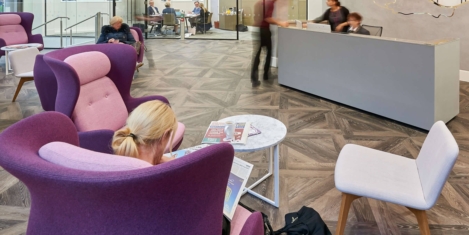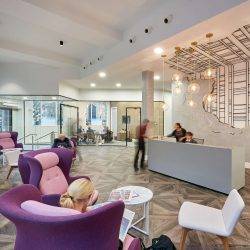To provide the best experiences, we use technologies like cookies to store and/or access device information. Consenting to these technologies will allow us to process data such as browsing behaviour or unique IDs on this site. Not consenting or withdrawing consent, may adversely affect certain features and functions.
The technical storage or access is strictly necessary for the legitimate purpose of enabling the use of a specific service explicitly requested by the subscriber or user, or for the sole purpose of carrying out the transmission of a communication over an electronic communications network.
The technical storage or access is necessary for the legitimate purpose of storing preferences that are not requested by the subscriber or user.
The technical storage or access that is used exclusively for statistical purposes.
The technical storage or access that is used exclusively for anonymous statistical purposes. Without a subpoena, voluntary compliance on the part of your Internet Service Provider, or additional records from a third party, information stored or retrieved for this purpose alone cannot usually be used to identify you.
The technical storage or access is required to create user profiles to send advertising, or to track the user on a website or across several websites for similar marketing purposes.
 As companies struggle to motivate teams working remotely, new research by the charity Education and Employers and the CIPD, claims that employers who support their staff with volunteering in schools and colleges has found employees to be more motivated, more productive and have a better sense of well-being. (more…)
As companies struggle to motivate teams working remotely, new research by the charity Education and Employers and the CIPD, claims that employers who support their staff with volunteering in schools and colleges has found employees to be more motivated, more productive and have a better sense of well-being. (more…)





 Data from thousands of employees across the country has been aggregated in a new report, detailing the mental wellbeing of the workforce over the course of the year. The research from
Data from thousands of employees across the country has been aggregated in a new report, detailing the mental wellbeing of the workforce over the course of the year. The research from 
 To say that 2020 has been a tough year is an understatement, and it appears that there has been an increase in the amount of alcohol being consumed whilst working from home since the pandemic began, according to Health and Safety software company
To say that 2020 has been a tough year is an understatement, and it appears that there has been an increase in the amount of alcohol being consumed whilst working from home since the pandemic began, according to Health and Safety software company 
 Research published by
Research published by 
 Productivity, morale and the ability to serve customers are being hamstrung by technology issues at European mid-size businesses, accordingly to research commissioned by
Productivity, morale and the ability to serve customers are being hamstrung by technology issues at European mid-size businesses, accordingly to research commissioned by 
 Statistics released from payroll and HR company
Statistics released from payroll and HR company 


 Almost half of UK businesses have seen an employee move on because their mental health wasn’t being looked after, with a quarter losing a key member of their workforce, according to new
Almost half of UK businesses have seen an employee move on because their mental health wasn’t being looked after, with a quarter losing a key member of their workforce, according to new 
 A newly commissioned survey of 1,000 people conducted by Censuswide on behalf of
A newly commissioned survey of 1,000 people conducted by Censuswide on behalf of
 Most of the analysis about the effects of the 2020 pandemic on people’s working lives has tended to involve grand statements about new normals and the death of this or that, as if everybody wants the same things, has the same personal circumstances, works in the same ways, the same places and same sectors.
Most of the analysis about the effects of the 2020 pandemic on people’s working lives has tended to involve grand statements about new normals and the death of this or that, as if everybody wants the same things, has the same personal circumstances, works in the same ways, the same places and same sectors. 
 Earlier this month, in a sudden and unexpected turn of events, the prime minister’s chief adviser, Dominic Cummings, walked out of 10 Downing Street for the last time, having resigned/been asked to leave, depending on whose account of the episode you believe. However, the affair unfolded in reality, it seems clear that the departure of Cummings and Director of Communications, Lee Cain, was precipitated by workplace conflict and a series of internal disagreements, which had pushed their relationships with certain colleagues to breaking point.
Earlier this month, in a sudden and unexpected turn of events, the prime minister’s chief adviser, Dominic Cummings, walked out of 10 Downing Street for the last time, having resigned/been asked to leave, depending on whose account of the episode you believe. However, the affair unfolded in reality, it seems clear that the departure of Cummings and Director of Communications, Lee Cain, was precipitated by workplace conflict and a series of internal disagreements, which had pushed their relationships with certain colleagues to breaking point. 







December 16, 2020
The weakness of purpose and the shift to problem-solving
by Steven van Belleghem • Business, Comment